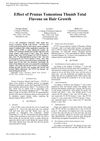natural substance from Neem tree with medicinal and pesticidal properties
diabetes drug with anti-inflammatory, immunomodulatory, and insulin-sensitizing properties
autoimmune disorder causing patchy hair loss
Heavy duty finasteride that comes with higher risks, but scalp injections seem safe and are gaining popularity




